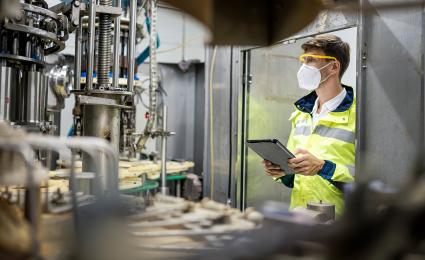How is technology moving our world forward? The 2022 Consumer Electronics Show (CES) puts the spotlight on the technology trends and developments that will shape the way we live and do business, impact the economy, disrupt current business models, and create new opportunity for stakeholders.


Developing a sustainable strategy for your company
The case for kick-starting your net zero emissions today
Comprehensive carbon calculations are the best way to reach net zero emissions today, according to recent case studies. Here’s why that matters and what you can do about it.

"Today’s leading companies must calculate their emissions, develop supporting and provide monitoring and reporting of their ongoing sustainability results."
Going green is having a growing effect on the bottom lines of the world’s largest companies.
Consider this: investors are rewarding companies that take aggressive climate action and punishing those who do not. Younger customers—who are quickly becoming tomorrow’s majority—are increasingly turning to, valuing, joining, and paying a premium to brands with a sustainable mindset. On top of that, regulators around the world are requiring companies to quantify and certify their carbon emissions in their quarterly reporting.
Although this change is a significant challenge for many businesses, Roland Berger has observed how best in class leaders are already capitalizing on these trends, beating the competition, and making detailed reduction goals and supporting metrics a part of their regular reporting.
Here are the four biggest factors at play.
Younger consumers have already made environmental, social, and corporate governance (ESG) one of their defining issues. This is reflected in how younger generations already consider carbon footprints before making purchases, accepting job offers, and even paying a premium for sustainable products. In particular, millennials are paying attention to climate-friendly solutions. For example, a recent study by Cushman & Wakefield found that green-certified buildings earn 11% higher rents and measurably lower vacancy rates when compared to less energy efficient peers.
Consequently, companies are taking note and making efforts to reduce their carbon emissions in an effort to appeal to this growing demographic that’s expected to account for 72% of the world’s workforce by the end of the decade (compared to 52% by the end of last decade). With that growing market share, it’s easy to see why established and startup companies are making environmental and social commitments a big part of their effort to recruit and retain tomorrow’s top talent. Additionally, sustainability strategies are essential nowadays when it comes to differentiating from competitors, satisfying stakeholders as well as improving margins.
Consumers aren’t the only ones changing the rules. Investors and Wall Street are pushing companies and their respective boards for aggressive climate action supported by concrete plans and timelines. For example, Vanguard, State Street, and BlackRock, which collectively have nearly $20 trillion in USD assets under management, have made strong public statements in favor of climate action. These investment firms have also taken action to change corporate board members of publicly held companies that they perceived were not taking climate change seriously Case in point: EptonMobil.
Last but not least, public policy regulators around the world are mandating increased climate disclosures for large companies. For example, the Taskforce on Climate-related Financial Disclosure (TCFD) is shifting from a voluntary approach to being the main regulatory response to ongoing climate risks. Although the TCFD has yet to be officially endorsed by participating governments, the United States, European Union, United Kingdom, Brazile, and Japan have all expressed interest in adopting it and/or similar measures to make emissions reporting mandatory for large companies.
Calculate your future with the help of Roland Berger
To compete for the future, we believe today’s leading companies must calculate their emissions, develop supporting tools for product development and financial planning, and provide monitoring and reporting of their ongoing sustainability results.
To that end and after working with several leading organizations around the world, Roland Berger has developed a proprietary Carbon Calculator to quantify, certify, and report the net zero emissions standards of participating companies to all stakeholders, especially consumers, employees, investors, and regulators.
At the end of every sustainability project, we deliver a customized business intelligence dashboard that can be fully integrated with existing IT systems and easily updated to monitor and communicate a company’s emissions achievements over time. The data sitting behind the dashboard can be downloaded into excel spreadsheets for internal and external reporting and communications, such as sustainability reports and other corporate presentations.
Thank you for reading. To learn more, please consider our full presentation on net zero emissions or contact us today.
Register now to download the full study to learn more about the demand of customers, employees and investors for sustainable solutions. Get also regular insights into our Industrials topics.









